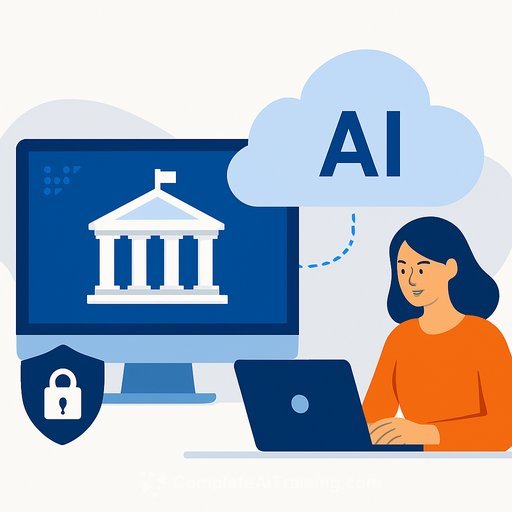Australian Creators Can Negotiate, Not Be Dictated To: Government Rules Out AI Text & Data Mining Exception
Australia will not create a Text and Data Mining (TDM) exception in copyright law. That decision sets the ground rules for AI development: consent, licensing, and compensation come first.
For government teams, the message is clear. Any AI workflows or procurements that rely on scraping or bulk ingestion of copyrighted material must be backed by rights, not assumptions.
What the decision means
Attorney-General Michelle Rowland said the Government is "standing behind Australia's creative industries" by ruling out a TDM exception. She noted that AI brings opportunity, but Australian creatives must share in the upside, and that there are "no plans to weaken copyright protections" for AI.
The Government has asked the tech and creative sectors to work together on "sensible and workable solutions" that support innovation while paying creators. That points directly to licensing, transparency, and enforceable standards.
What government agencies should do now
- Audit current and planned AI use. Identify all datasets, models, and content sources. Record rights, licences, and terms.
- Update procurement. Require vendors to warrant that training and tuning data is lawfully sourced and licensed, with indemnities.
- Demand provenance. Ask for dataset documentation, data lineage, opt-out/takedown mechanisms, and logs of model training and updates.
- Budget for licences. Plan for collective and direct licensing where models or tools rely on copyrighted works.
- Refresh internal guidance. Clarify acceptable use of generative outputs, fair dealing limits, moral rights, and Crown copyright considerations.
- Strengthen recordkeeping. Keep contracts, licence terms, model cards, and risk assessments ready for audit or dispute resolution.
Licensing and enforcement on the table
The Government is convening its Copyright and AI Reference Group today and tomorrow to examine three areas: a paid collective licensing framework, clearer treatment of AI-generated material under copyright, and practical enforcement options, including a small claims forum.
Agencies should expect movement on collective licensing schemes and clearer compliance signals for AI deployments. Keep an eye on updates from the Attorney-General's Department's copyright page for official guidance and any consultation papers. Attorney-General's Department: Copyright
Industry response
Rowland emphasised the cultural and economic stakes: "Australian creatives are not only world class, but they are also the lifeblood of Australian culture, and we must ensure the right legal protections are in place." She reiterated there are no plans to weaken copyright protections for AI.
News Corp Australasia's executive chairman, Michael Miller, welcomed the stance, saying it reinforces outcomes where creators control access, terms, and payment. He also urged swift action on support measures for small and regional media companies.
Annabelle Herd, CEO of ARIA and PPCA, called the decision a clear commitment to "consent, control, and compensation" in the age of AI. She said there is no case for new loopholes that would dilute a creator's right to permission and transparency, adding that existing licensing structures are proven, flexible, and compatible with innovation.
Claire Pullen, CEO of the Australian Writers' Guild and the Australian Writers' Guild Authorship Collecting Society, said the announcement resists pressure from large foreign tech firms seeking to "strip-mine our culture and content." Her message: Australian creators should be partners in ethical AI development - able to negotiate terms, not be dictated to.
Policy and procurement checklist
- Insert data rights clauses into all AI-related RFTs and contracts: lawful source guarantees, audit rights, indemnities, and penalties for breach.
- Request model documentation: training sources, licensing status, exclusion lists, and update cadence.
- Set approval gates: any new model or dataset use must show rights clearance before deployment.
- Plan for paid access: collective licences where appropriate; direct licences for niche or high-value content.
- Define red lines: no use of unlicensed scraping for training, tuning, or evaluation.
- Prepare for disputes: nominate a contact point, template notices, and escalation paths if a small claims forum launches.
Implications for AI outputs
Teams should document how generative outputs are created, stored, and used in public communications or services. Consider whether outputs may reproduce protected material and set review gates for high-risk uses.
If vendors fine-tune models on agency content, specify ownership, reuse limits, and off-tenant restrictions. Make sure any third-party data mixed into those workflows is licensed and auditable.
Capacity building for public sector teams
This shift puts a premium on digital procurement, IP literacy, and AI risk management. Upskill staff who draft tenders, negotiate contracts, and run data governance.
If you are formalising internal training on IP-safe AI practices and vendor oversight, you can browse structured options by job role and current offerings here: AI courses by job and Latest AI courses.
Bottom line
No TDM exception means AI systems used by government must be built on licensed content with clear permissions. Agencies that move early on procurement clauses, provenance standards, and staff training will save time, money, and legal risk later.
Your membership also unlocks:






